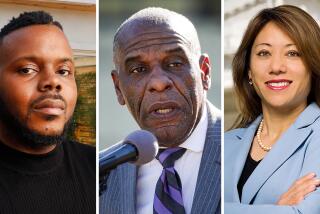3 Lawmakers Called Possible Successors to Wilson in Senate
WASHINGTON — Reps. William M. Thomas (R-Bakersfield), Jerry Lewis (R-Redlands) and David Dreier (R-La Verne)--whose congressional districts converge in the high desert of the Antelope Valley--have suddenly found themselves sharing heady political turf as well.
Each has appeared on various pundits’ lists of potential candidates for the U.S. Senate seat being vacated by Gov.-elect Pete Wilson, who will appoint his successor. The Los Angeles Times, the New York Times, the Washington Post and the Christian Science Monitor, among others, have speculated on the trio’s possible upward mobility since the Nov. 6 election.
The lawmakers, apparently not wanting to appear to be campaigning for the appointment, have been as tight-lipped about the matter as Wilson. Each, however, is believed to be interested.
Among the assets that Thomas, Lewis and Dreier share are home bases in vote-rich Southern California, a working knowledge of Congress and track records as proven campaigners. At the same time, all have shortcomings that could eliminate them from serious consideration.
“All three have a common weakness,” said Allan Hoffenblum, a California Republican political consultant. “They’re certainly not household names, and they all happen to be white Anglo males. Some people think Pete might be more bold.”
Hoffenblum is among a number of GOP activists who maintain that Wilson should seek to broaden the party’s appeal by appointing a woman or minority successor. State Sen. Rebecca Q. Morgan (R-Los Altos Hills), a Wilson friend, and Gaddi Vasquez, a popular Orange County supervisor, each would fit such a strategy.
Carla A. Hills, President Bush’s trade representative, has also been mentioned prominently, but she intends to remain in her present post, spokesman Timothy O’Leary said last week.
Analysts and activists agree that no big-name Republican looms as an obvious selection. This reflects, in part, a dearth of statewide GOP officeholders, the party’s longtime minority status in the state Legislature and its numerical disadvantage in California’s congressional delegation, in which Democrats hold 27 of 45 seats.
First and foremost, the prospective senator must be able to raise huge sums of money and wage an effective, television-saturated statewide campaign. The appointee will have to run in 1992 to complete Wilson’s term and, if successful, seek reelection two years later for a full six-year term. Each campaign is expected to cost as much as $20 million.
In addition, Wilson has said he intends to appoint someone who concurs with his views, particularly his support for some abortion rights, capital punishment and environmental protection.
The explosive abortion issue alone could disqualify Dreier and Lewis. Each has a consistently anti-abortion record.
Thomas, like Wilson, maintains that government should not outlaw abortion. Both lawmakers have supported public funding of abortions only in cases of rape or incest or when the mother’s life is in danger. In addition, Wilson has said he would support federal payments for abortions if there were no other source of funding for poor women.
“This is a problem that Pete Wilson faces, which is that the vast majority of elected Republicans in the state are anti-choice,” said Robin Schneider, executive director of the National Abortion Rights Action League for Southern California. “That does dwindle his prospects if he wants to appoint someone who is pro-choice.”
Nevertheless, a longtime Wilson associate who is serving on the governor-elect’s transition team said the pragmatic Lewis, 56, has a certain appeal.
“Pete likes Jerry,” said the Wilson adviser, who offered his assessment of the three Southern California lawmakers’ chances on condition that he not be identified. “They’ve cooperated with each other over the years. They are simpatico. And Jerry can raise money.”
At the same time, the adviser said he wondered whether Lewis has “the staying power to do two back-to-back, $20-million campaigns.”
In any case, Lewis must first overcome an expected--and potentially bruising--challenge next month as House Republican Conference chairman, the third-ranking leadership post. The six-term lawmaker, whose 35th District includes half of Palmdale, is under fire from the GOP’s right-wing for supporting Bush’s original deficit-reduction package, which Congress rejected.
Thomas, 48, is a bright, outspoken 12-year veteran who has been deeply immersed in such tactical political issues as redistricting, campaign finance reform, and California Republican Party appointments and platforms. In the process, he has antagonized conservative Assembly Minority Leader Ross Johnson (R-La Habra); Johnson’s predecessor, Assemblyman Pat Nolan (R-Glendale), and Reps. William E. Dannemeyer (R-Fullerton) and Robert K. Dornan (R-Garden Grove).
“He has made more than his share of serious opponents and enemies,” the Wilson associate said of Thomas. “He’s way too involved in the minutiae of the Republican Party.”
Thomas, whose 20th District includes Lancaster, points out that he has often been allied with Wilson in internecine struggles. They have included opposing conservative efforts to drum a gay GOP group out of the party and to adopt an anti-abortion plank in the state platform.
“Sen. Wilson and I tend to see the world the same way on issues, and we’ve always wound up in the same position,” particularly on the question of “whether the party will be open to everyone,” Thomas said.
Dreier, 38, a five-term lawmaker whose 33rd District includes Littlerock, Pearblossom and a sliver of Palmdale, has demonstrated an ability to win tough races as well as raise large sums of money. He defeated Democratic Rep. Jim Lloyd in his second try in 1980 and then, after reapportionment, defeated Republican Rep. Wayne Grisham in a primary two years later.
Dreier is often cited for his fund-raising acumen. He had garnered $515,997 during the present two-year legislative cycle and had stockpiled $1.6 million as of Oct. 17. Thomas, meanwhile, has raised $374,322 since Jan. 1, 1989, and has $222,291 on hand; Lewis has raised $418,946 and has $340,090 in the bank.
But the Wilson associate said that even though the senator and Dreier are “good friends,” Dreier is “much more conservative” than the governor-elect. Legislatively, Dreier has waged unsuccessful campaigns to eliminate the Small Business Administration, the Export-Import Bank and federal subsidies for Amtrak.
Even if Wilson decides to appoint someone else, Lewis, Thomas or Dreier could still seek the seat held by Democratic Sen. Alan Cranston, who has announced that he will not run for reelection when his term expires in 1992. Both party primaries for this open spot are expected to be intensely contested.
Meanwhile, the Wilson confidante suggested that the governor-elect’s successor may turn out to be someone who is less well-known than those routinely mentioned as contenders. For example, he mentioned Rep. Tom Campbell (R-Palo Alto), an articulate moderate who supports abortion rights and has a track record for winning election in a competitive district.
In any case, the decision, among the most momentous that Wilson faces, is certain to be a difficult one. “I’m sure glad Pete has to make that decision and not me,” state Sen. Ed Davis (R-Santa Clarita) said.
More to Read
Get the L.A. Times Politics newsletter
Deeply reported insights into legislation, politics and policy from Sacramento, Washington and beyond. In your inbox three times per week.
You may occasionally receive promotional content from the Los Angeles Times.










